Mogwai: “It’s not necessary to have 45 tracks of an E string with a delay on it! But it’s still tempting…”
We chat to Stuart Braithwaite and Barry Burns about how the Scottish 4-piece made number 1 album As The Love Continues
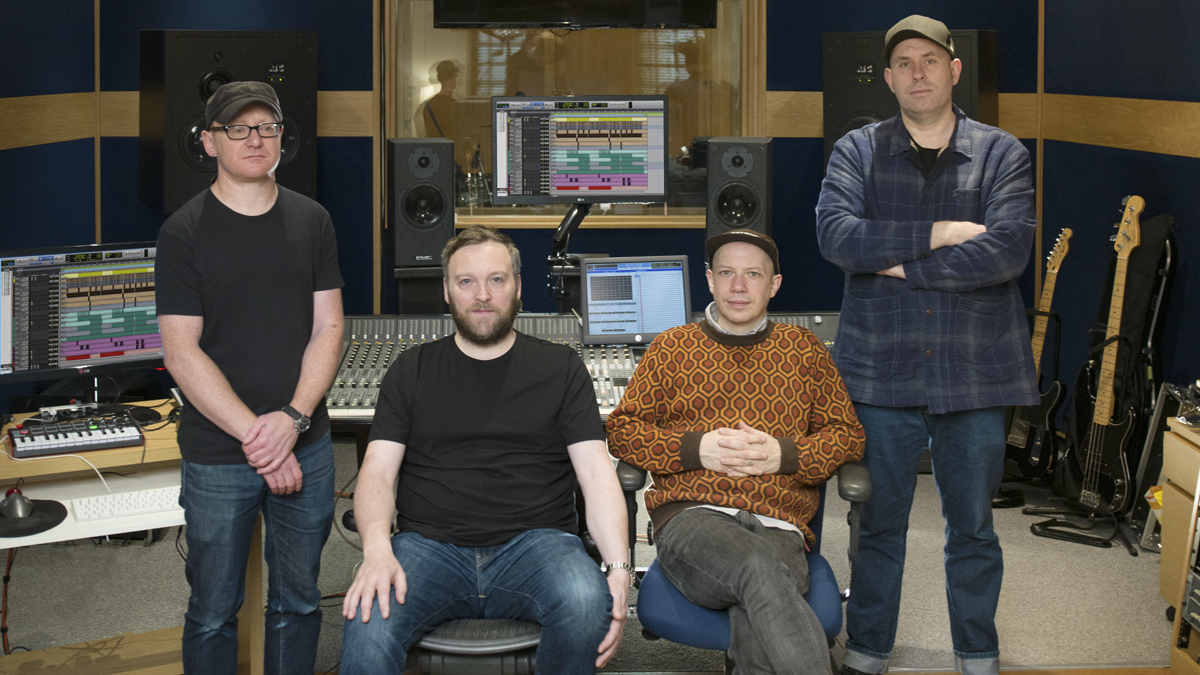
Want all the hottest music and gear news, reviews, deals, features and more, direct to your inbox? Sign up here.
You are now subscribed
Your newsletter sign-up was successful
Remarkably, it’s 25 years since Mogwai released their debut single, Tuner/Lower. In the intervening years the band have released nine studio albums including Rock Action, Rave Tapes and Every Country’s Sun, with the more recent releases gradually climbing further and further up the UK album chart.
They’ve created original soundtracks for films like Zidane: A 21st Century Portrait, the documentary Atomic, as well as the Sky Original drama ZeroZeroZero.
Last month they returned with their hugely-anticipated tenth studio album, As the Love Continues, which maintained that upward chart projectile. In fact, it became the band’s first number 1 in a quarter-century career.
As the Love Continues wasn’t the most straightforward album to produce. The original plan was to record it at Tarbox Road Studios in New York State with the legendary Flaming Lips and Mercury Rev producer Dave Fridmann. But, you’ve guessed it, due to the global pandemic, the band relocated to Vada studios in Worcestershire with Dave producing over Zoom, a far cry from recording at the Mogwai regular studio space, Castle Of Doom.
So what was it about Vada Studios that made it an ideal location to retreat to?
“The people that run it are really cool and it does have a really great live room,” recalls Stuart Braithwaite, Mogwai guitarist and vocalist. “I think the live rooms used to be an abbey, so it’s like this slightly medieval English countryside setting. It was really good to be somewhere else.
“To be honest, everything took real big steps from the demo point to how it ended up,” he adds. “I think the isolation aspect really helped the songwriting and the planning of the record. Also, being able to get away to that studio felt like such a big deal because we’d been stuck in our houses for months.”
Want all the hottest music and gear news, reviews, deals, features and more, direct to your inbox? Sign up here.
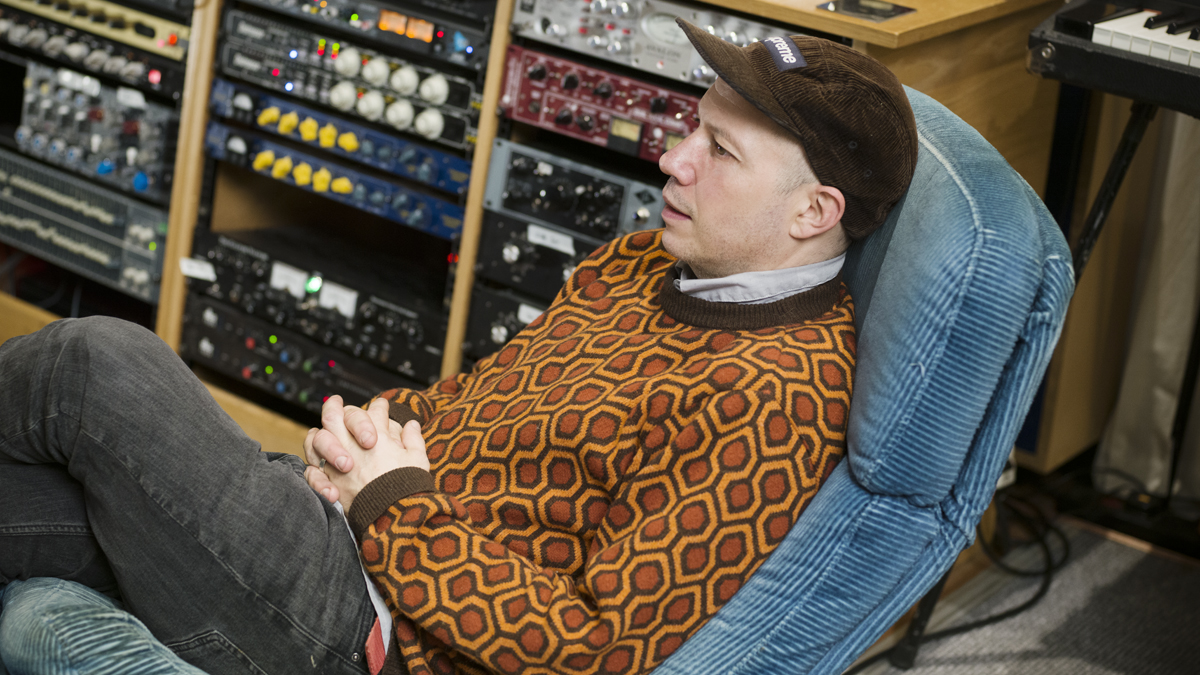
As well as the isolation, Vada Studio’s residential rooms and its extra space were important additional factors in enabling the creativity to flow.
“It needs space and a big drum room,” Barry Burns [guitars, vocals and keys] explains. “We’ve got Castle Of Doom, but it’s just a little bit too small. Dave [Fridmann] likes us to play live together and we can do that at Vada. It is pretty huge compared to what we’re used to.
“You also get into this nice routine,” he continues, “and with Vada, I also much prefer a residential thing because when we do the soundtrack stuff [at Castle Of Doom], I tend to go home for dinner and then just don’t come back! It’s really fucking lazy.”
Z is for…
‘Zoom call’ must have been one of the most overused and feared phrases of 2020, and while the ‘virtual pub’ and ‘Zoom quiz’ also became commonplace, the ‘Zoom recording session’ slipped under most radars, but became something of a norm for Mogwai.
“It was a bit of a weird experience having this sort of benevolent, Orwellian character on the television trying to direct stuff,” Barry says of working with Dave Fridmann over Zoom. “He’s a funny guy as well; he would put up things like Godzilla at the Golden Gate Bridge as his background and stuff like that.”
“You know what? It was really easy,” Stuart adds with a thoughtful smile. “I don’t think I envisaged him being as hands-on. I thought Dave would just be checking in and seeing how we were going, but he was genuinely there the whole time with the audio being shared from his studio. He could hear everything and he would be constantly talking to [Castle Of Doom producer] Tony Doogan about where the mics should be and all this kind of stuff, not just telling us if we were playing well enough or not. I have to be honest, it worked really seamlessly.”
The Fridmann effect
Working with Dave is no new venture. The band have been recording with the highly-regarded American producer on various projects since their second album Come On Die Young, released in 1999. The relationship they’ve forged, coupled with a similar penchant for experimentation, has pushed the band sonically over the years, and As The Love Continues continues in the same vein. Stuart takes up the story.
Being in a band filled with multi-instrumentalists, how does the Mogwai songwriting process work?
“There’s three of us that write music in the band, so the three of us tend to write and demo in our own houses,” Stuart says, talking about the band’s initial demo process. “It usually takes us about six months or so depending how much time we’ve got. We’ll share the demos around, people will write different parts and Martin, our drummer, will come up with ideas from people’s demos.
“For this record, we actually did a second full studio demo as well. So we got together, just seeing how everything’s sounding, whether something’s working, not working, and then we went and rehearsed some more and then went and made the record.”
Barry continues: “It’s usually me and Stuart, and Dom Aitchison. I’ve got my little studio in a building quite far away from my house which is important, with very shit internet, and I go in there for between two and six hours a day. Anything more than that I just come away with nothing good.
“I try and just sit and do like 20 minutes really concentrated. I think that’s enough - 20 minutes - and then have a little five-minute break and then go back to it.
“I write on guitar sometimes, but it’s usually mostly on synths, plugins and stuff, and I just make up little melodies at first. Occasionally, I get a couple of noises to get me going. I think that’s really important for the way that I do stuff. It’s even like a white-noise guitar with some sidechaining on it to get things going. I don’t ever think about what I’m doing.”
“Dave had produced Deserter’s Songs by Mercury Rev and The Soft Bulletin by The Flaming Lips which we were all big fans of. We had a chat with him and he seemed very much on our wavelength; I think he thinks about music in a similar way that we do. He’s very open to the possibilities of trying loads of different stuff and, if it doesn’t work, saying ‘oh well, we’ll try something else’.
“It’s got to the point where he feels like an extra member of the band now. Over the years, we’ve become more comfortable with trying any old madness that Dave suggests; it’s become a good working relationship.”
Stuart continues: “He had a philosophy on this record that for every single song, we had to do something that we’d never done. It might be a totally different style of guitar or using an instrument that we wouldn’t normally use. It was definitely a great process.
“Music for me is always about having fun and trying new things, experimenting and the excitement of writing new music, so the excitement of writing new music coupled with the excitement of trying different sounds is what keeps us going forward. I get really inspired by new bits of equipment, especially pedals.
“There’s a song on the album, Ritchie Sacramento, which literally just started with me messing about with these two delay pedals and coming up with a loop, before writing a song completely around that loop. The pedals are the Red Panda Particle pedal - which is the one that Alan Sparhawk from Low used a lot on their last album - and the Lysergic Emotions Module. It’s Italian and it’s pretty serious. It has so many settings. There are dials on there for people trying to break into a bank, so it’s hard to make it sound the same from day-to-day, but it’s really awesome; it sounds great.”
This effect processing philosophy also includes using a now defunct pedal for the melody on the album’s second track, Here We, Here We, Here We Go Forever, as Stuart explains.
“That’s a weird one, the way that turned out. It’s an Electro Harmonix Vocoder - it’s kind of like an auto tune but from a guitar pedal. I think I used it years ago with the guitar on the song George Square Thatcher Death Party. I now think the pedal’s broken because [for this song] we did it with proper auto tune in the studio and Dave just liked the demo better, so he actually made me record it with the shitty broken pedal in my home studio and that’s what he used.
“The track actually has lyrics as well. That pedal doesn’t sound right if you just make funny noises, so I ended up writing a set of lyrics that no one will ever be able to hear, but that’s fine, I quite like that sense of ridiculousness.”

The pushing of the musical process wasn’t just confined to pedal choices, either. The use of drum machines within songs is nothing new for Mogwai but opening Here We, Here We, Here We Go Forever with such a distinctive bouncing rhythmic electrical beat meant a degree of trial and error before succumbing to what we all do best: buying a new piece of gear. Barry talks us through this inevitable process.
“I’ve got some modular stuff, but every time I try a make a nice melodic synth, I always end up with a fucking bass drum sound after two hours.
“I’d bought the Elektron Analog Rytm but I got put off a little bit by all the menu-diving on it. It’s a great drum machine, but I get really sidetracked with stuff like that and I don’t come up with anything good, very quickly. So I got the Moog DFAM and it was a lot of fun. I like it because it’s quite limited in what it can do, but then I just made, like, four different tracks of it and layered them up. It’s a lot of fun - that thing is amazing.”
In the rack and on the board
Beyond delay pedals, broken vocoders and DFAM drum machines there are a few more pivotal pieces of hardware and software that went into creating As The Love Continues.
“The Dave Smith OB-6 has featured quite a lot,” says Barry, “as have a bunch of Arturia plugins. I really like the Roland SE-02, the Studio Electronics collaboration, and I’ve just started using UAD Softube plugins.
“For this album I also bought the Black Corporation Deckard’s Dream, the CS-80 clone. I use it on Dry Fantasy; it took me ages to get that sound because it’s just really finicky. I bet there’s a preset on it that sounds exactly the same! I layered it quite a lot with the DX7 Arturia plugin and then I used the Korg ARP Odyssey as well and kept layering the same tune over and over again towards the end of the song.”
The use of spoken word can be found through a number of Mogwai records and As The Love Continues follows suit, although on this occasion the source was a little different, as Stuart explains.
“Usually, it’ll just be something weird that we find, but this one’s actually a cool story. The voice is Ben Power from Blanck Mass talking in his sleep. He’s started recording his sleep talking because he’s been saying the most insane shit and, yes, he said that and we used it as a song title and the actual recording at the start of the record.”
Moving over to software, Barry describes his plugin experimentation process.
“I used loads of the automation stuff in Ableton on this album as well. I’ll get white-noise guitar and put resonator plugins on it and then automate the gains of them so that there’s all these notes that are in key with the song, coming in and out.
“In the last four or five years I’ve been working with Kangding Ray, the electronic musician. He taught me a lot about that stuff and I think plugins have got so good now. Some of them I don’t think you can really tell the difference any more. You used to be able to. You always used to always have to take some of the high-end off them, but now they sound brilliant.”
And, of course, with Mogwai being rock, post-punk, alt-rock, or however you want to describe them, the guitar and guitar effects - both hard and soft - still play the dominant role in their music.
I definitely appreciate the tools that recording with a computer brings, but I can’t imagine making a record without an EHX Big Muff and a Jim Dunlop Wah Wah pedal.
“I demo in Logic and I use one of the Eventide plugins and the Soundtoys plugins,” Stuart explains. “I definitely appreciate the tools that recording with a computer brings, but I can’t imagine making a record without an EHX Big Muff and a Jim Dunlop Wah Wah pedal.
“I’ve got a pile of delays, some really nice reverbs and I’m getting really into the Eventide H9 now. It was actually Barry that got me using it. It’s a bit complicated for me generally, but he encouraged me to persevere with it and I’ve actually managed to do some cool stuff.”
Barry adds, “I prefer to do the synth stuff, but I play guitar as well. For this album, as well as my old brown ‘80s SG and Orange amp, I played a Fender Jaguar for the first time. It’s so much fun, but does have quite an amusing feature that I noticed when we were recording: playing too close to the pick-up switches it off [laughs].”
And on his effects?
“I just use the UAD plugins as effects when I’m recording stuff, but live I’ll usually have three distortion pedals,” he replies. “The first is this little blue shiny Sitori Sonics pedal based on a Big Muff, but it sounds so much better. The lighting designers always hate it because it’s got this blue LED which is brighter than the sun.
“The really mental pedal is the WMD Geiger Counter with this bit-depth thing on it. Finally, I just got a new one from Animal Factory Amplification called Godeater. It’s basically a bass guitar distortion and is brutal; sounds amazing with a drum machine going through it, too. I also use an EQ to make everything sound worse(!), plus a couple of delays and the Eventide H9 pedal.”
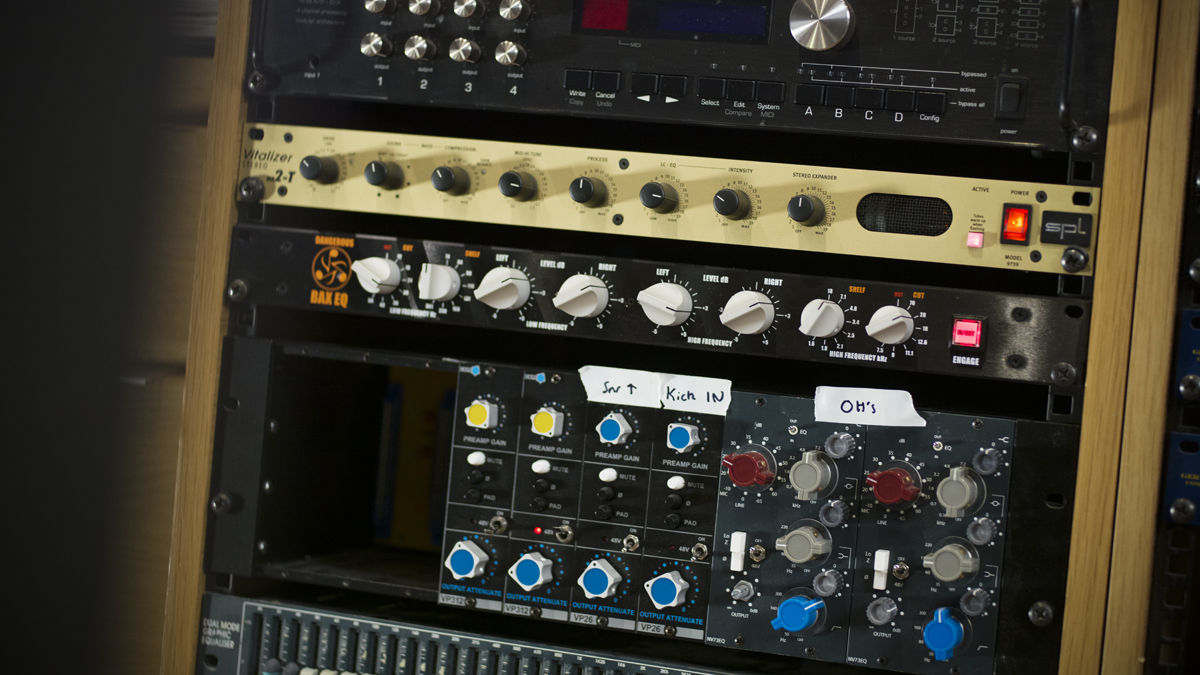
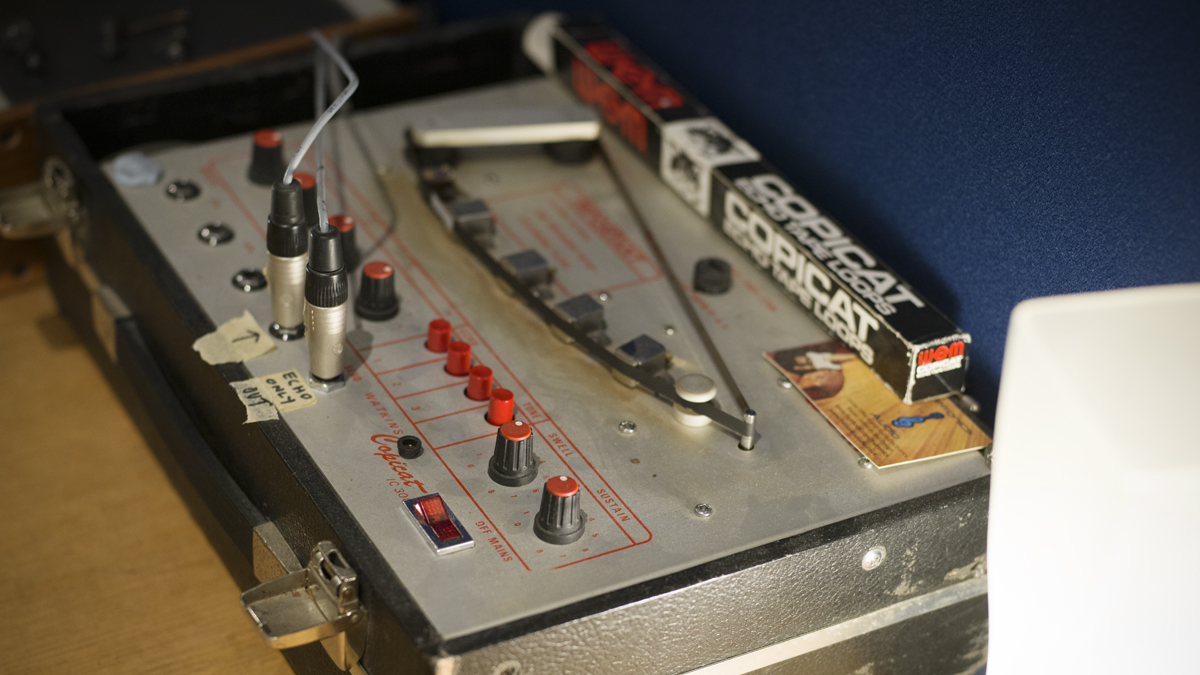
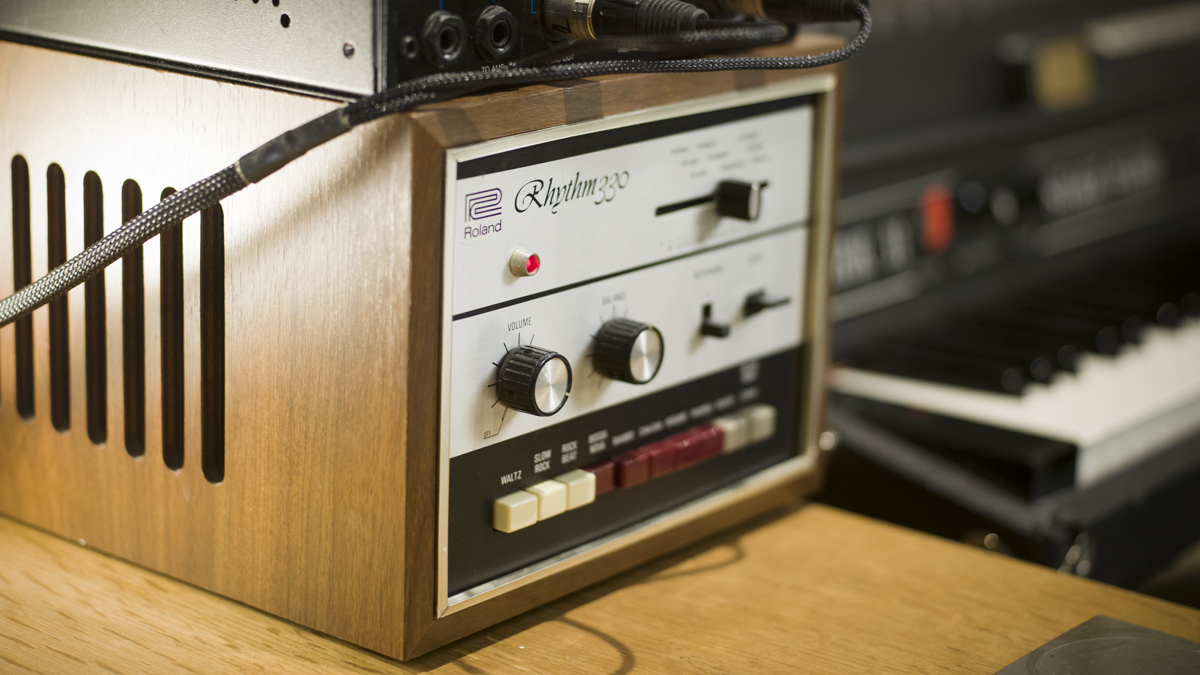
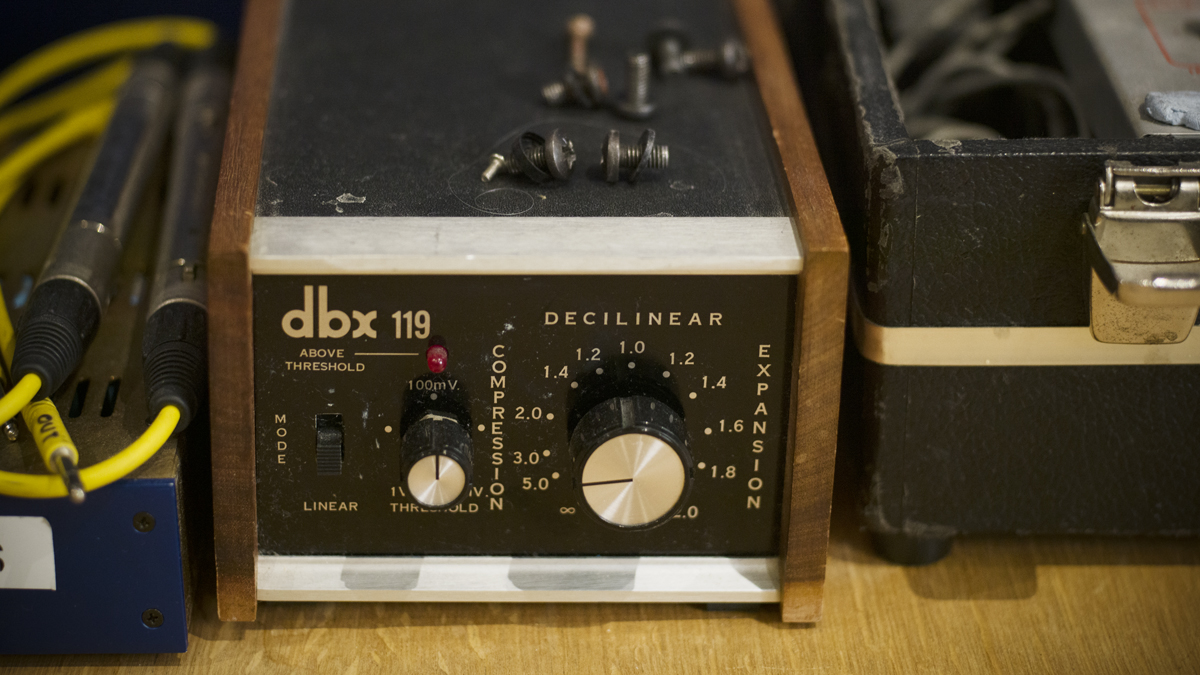
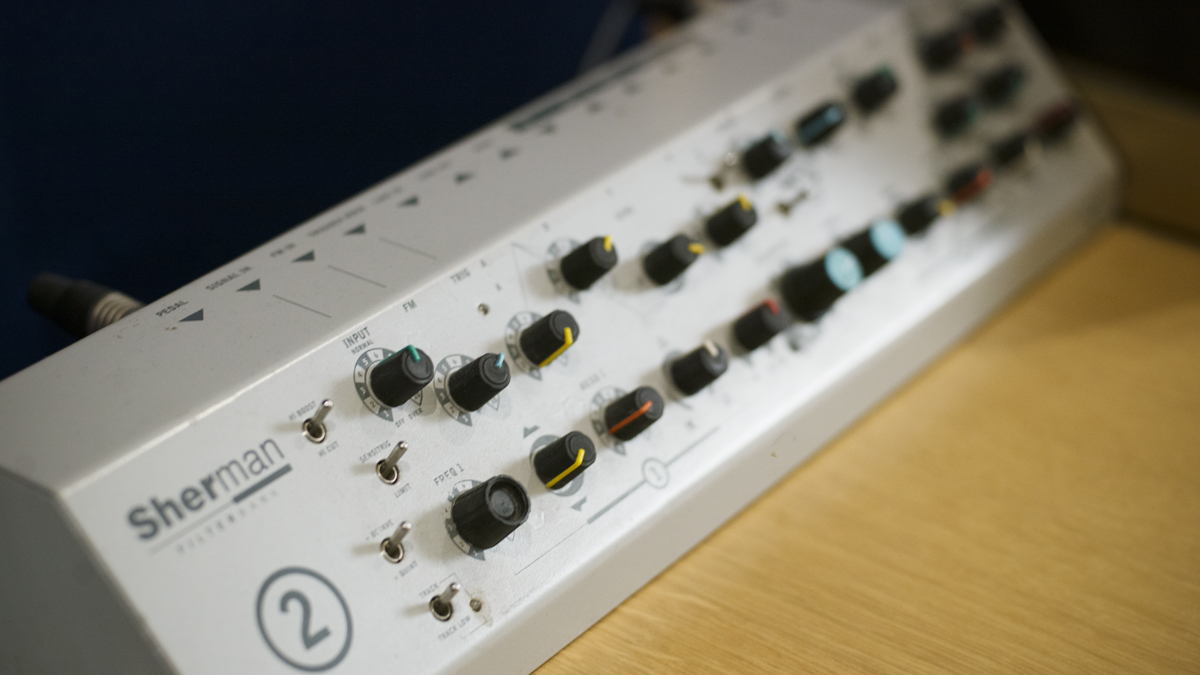
Paring back the mix
Over the years, Mogwai have become famed for the minimal complexity of their music, with sweeping atmospheric passages that build into supercharged chorus sections. Achieving this and avoiding the urge to add that extra layer - that additional found sound or that third radiation measuring distortion pedal - must be difficult, but paring back the mix before mastering is something the band have finally learned to do.
“I think it’s through practice that we’ve got to this stage,” Barry explains. “Again, for me, it was working with Kangding Ray, watching him delete stuff that wasn’t working and be really critical of it. I’ve definitely learned a lot from him and I think it’s passed on to the band, where we’re like, ‘it’s just not necessary to have 45 more tracks of an E string with a delay on it’! But it’s still tempting…”
“I think it’s important that music can breathe and I think you can go over the top,” Stuart continues. “I find that I listen to a lot of records and I’ll be like, ‘my God, my head hurts, there’s just so much going on here’. I think a lot of that comes from bands where the individual members have egos, whereas I don’t think we particularly do. I’m sure we have some kind of collective ego because otherwise you wouldn’t bother doing it at all.
“I’ve been around some bands and they’ll be like, ‘turn me up’ and you’re like, ‘why?’! It’s perfectly manageable to mix a record and be able to hear everything without one thing being louder than the other one, unless that’s the main melody of the song or whatever. So yes, we don’t really care about being the loudest; we just let it try and sound good as a whole.”
Going live (one day)
It’s always interesting speaking to bands about how much thought they put into being able to play tracks live while they’re writing and recording an album. Speaking with Stuart and Barry generates two very different responses…
“I never think about that,” Stuart replies first. “Barry does, he’ll always go, ‘oh my God, how are we going to play this live?’ I don’t care if it sounds the same and it wouldn’t bother me if it sounded totally different live. Thankfully, there are people in the band that are a bit more conscientious than me!”
Barry adds: “The freedom of our soundtrack stuff is you don’t always have to worry about that, but when we’re doing the album, sometimes we can tell this [track] is never getting played live and it’s fine. But yeah, I think about it quite early on. I think that with all the songs on the new album that maybe we’ve lucked out and we could play all of them live. In fact, when we rehearsed here a few weeks ago, it was the first time that we’d played some of them together as a band because they were just written on my laptop or wherever. So you never really know, but I’m always trying to keep it [playing live] in mind.”
Stuart brings our conversation to a close by answering the all-important ‘Z’ question. Will the band be recording over Zoom again?
“I think there’s a good chance. We’re planning on doing some work at our studio which would probably mean that we would be doing all our recording in Glasgow in the future. One of the problems is our live room is not that big and we quite like to be able to fully set up and all just play at once, but when that building work gets done, I don’t know if we’d have the need to really leave as much and we’d like to probably try and do more and more here.”
As The Love Continues is out now on Rock Action Records and is available in various formats including digital download, CD, double vinyl and a special edition colour double vinyl box set. More info and tickets for a live stream can be found on the Mogwai website.
5 Mogwai tracks you need to check out
Yes! I Am A Long Way From Home
Young Team, 1997
Starting right at the beginning, Yes! I Am A Long Way From Home is the first track from the band’s debut album and contains all the steady ambient meandering, volume swells and booming chorus sections the band are famed for. Rumour has it that if you play the spoken work part at the end of the track backwards it’s quite rude.
Dial : Revenge
Rock Action, 2001
With Take Me Somewhere Nice stealing the show on the band’s third album, Rock Action, Dial : Revenge (despite being a single from the album) has managed to hide in the shadows to a degree. One of the Mogwai’s more tranquil tracks, the song opens with this gentle acoustic guitar riff before Gruff Rhys of Super Furry Animals fame enters with a beautiful Welsh vocal melody.
Glasgow Mega-Snake
Mr. Beast, 2006
If Dial : Revenge is one of Mogwai’s more tranquil tracks, Glasgow Mega-Snake is one of their more raucous. Opening with a clean fuzz-driven guitar riff that repeats throughout the song, this track is pure, fast-paced rock at its finest.
Crossing The Road Material
Every Country’s Sun, 2017
There is a degree of bias here as Crossing The Road Material is probably this writer’s favourite Mogwai track. Opening with a dreamy mix of atmospheric keys and guitar the track slowly builds with layers of drums, bass and additional guitar, before erupting into a massive sonic explosion that plays out to the end before dropping you back to earth with gentle aplomb. If you get the chance, check out the band’s recording of this track for KEHP on YouTube, if for no other reason than to see the smile that beams across Stuart’s face when the song explodes.
It’s What I Want To Do, Mum
As The Love Continues, 2021
There are a number of tracks from the new album that nearly made the cut, but we decided to go for the album’s closing track It’s What I Want To Do, Mum. It’s one of the band’s slower tracks and, despite the big guitar riffs and hard hitting drums that come in and out of the mix, it retains an almost angelic sense of exposed vulnerability. Quite lovely.

